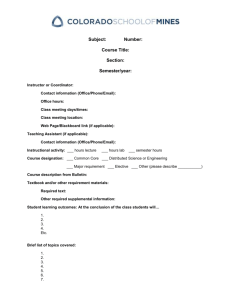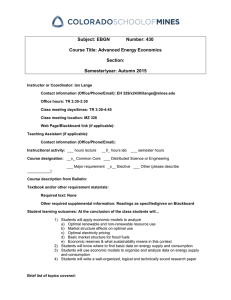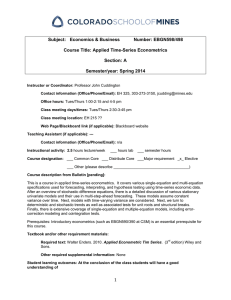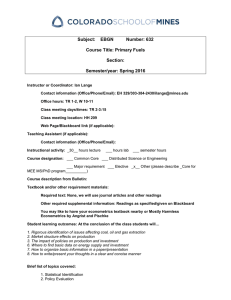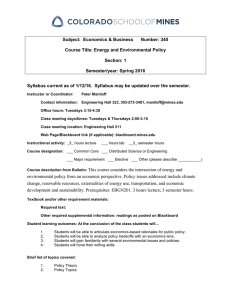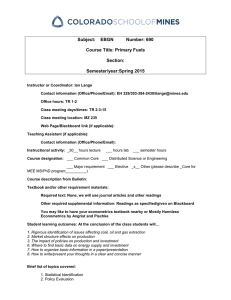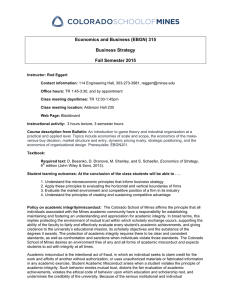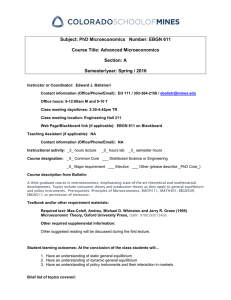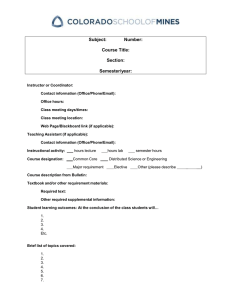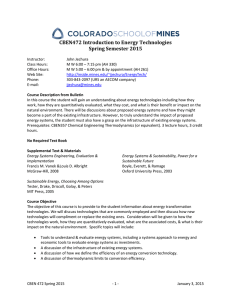Subject: GPGN ... Course Title: Current Topics in Strong Ground Motion Seismology
advertisement
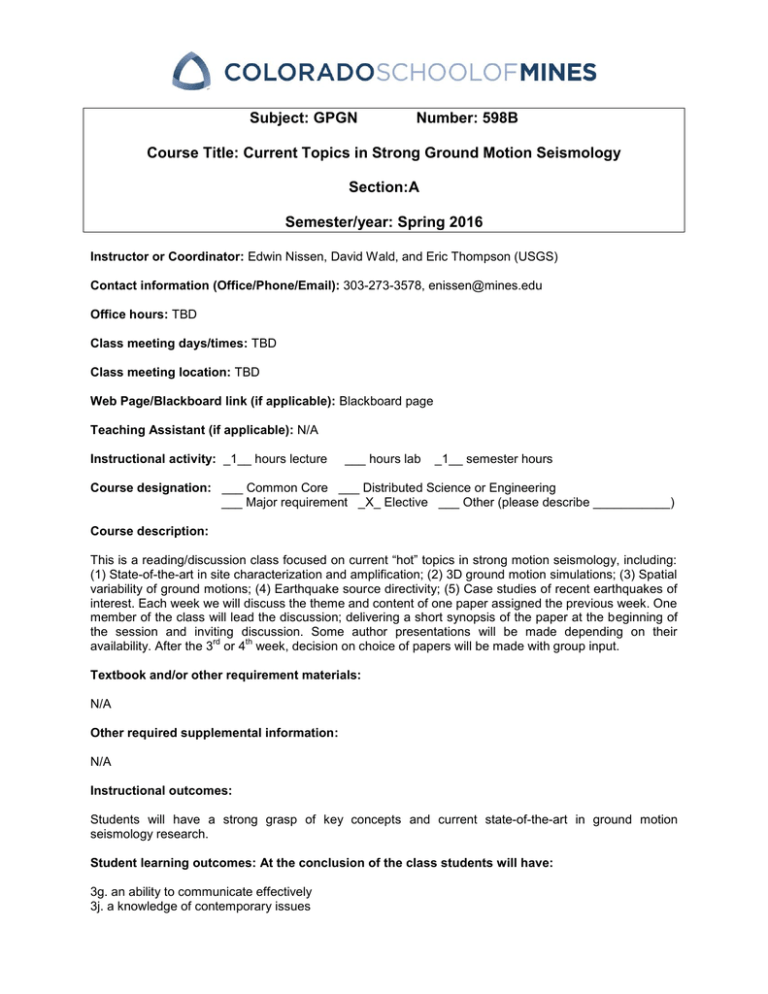
Subject: GPGN Number: 598B Course Title: Current Topics in Strong Ground Motion Seismology Section:A Semester/year: Spring 2016 Instructor or Coordinator: Edwin Nissen, David Wald, and Eric Thompson (USGS) Contact information (Office/Phone/Email): 303-273-3578, enissen@mines.edu Office hours: TBD Class meeting days/times: TBD Class meeting location: TBD Web Page/Blackboard link (if applicable): Blackboard page Teaching Assistant (if applicable): N/A Instructional activity: _1__ hours lecture ___ hours lab _1__ semester hours Course designation: ___ Common Core ___ Distributed Science or Engineering ___ Major requirement _X_ Elective ___ Other (please describe ___________) Course description: This is a reading/discussion class focused on current “hot” topics in strong motion seismology, including: (1) State-of-the-art in site characterization and amplification; (2) 3D ground motion simulations; (3) Spatial variability of ground motions; (4) Earthquake source directivity; (5) Case studies of recent earthquakes of interest. Each week we will discuss the theme and content of one paper assigned the previous week. One member of the class will lead the discussion; delivering a short synopsis of the paper at the beginning of the session and inviting discussion. Some author presentations will be made depending on their rd th availability. After the 3 or 4 week, decision on choice of papers will be made with group input. Textbook and/or other requirement materials: N/A Other required supplemental information: N/A Instructional outcomes: Students will have a strong grasp of key concepts and current state-of-the-art in ground motion seismology research. Student learning outcomes: At the conclusion of the class students will have: 3g. an ability to communicate effectively 3j. a knowledge of contemporary issues Student Outcomes Addressed by Course: a b c d e f g X h i j X Criterion 3 k 1 2 program criteria Brief list of topics covered: N/A Policy on academic integrity/misconduct: The Colorado School of Mines affirms the principle that all individuals associated with the Mines academic community have a responsibility for establishing, maintaining an fostering an understanding and appreciation for academic integrity. In broad terms, this implies protecting the environment of mutual trust within which scholarly exchange occurs, supporting the ability of the faculty to fairly and effectively evaluate every student’s academic achievements, and giving credence to the university’s educational mission, its scholarly objectives and the substance of the degrees it awards. The protection of academic integrity requires there to be clear and consistent standards, as well as confrontation and sanctions when individuals violate those standards. The Colorado School of Mines desires an environment free of any and all forms of academic misconduct and expects students to act with integrity at all times. Academic misconduct is the intentional act of fraud, in which an individual seeks to claim credit for the work and efforts of another without authorization, or uses unauthorized materials or fabricated information in any academic exercise. Student Academic Misconduct arises when a student violates the principle of academic integrity. Such behavior erodes mutual trust, distorts the fair evaluation of academic achievements, violates the ethical code of behavior upon which education and scholarship rest, and undermines the credibility of the university. Because of the serious institutional and individual ramifications, student misconduct arising from violations of academic integrity is not tolerated at Mines. If a student is found to have engaged in such misconduct sanctions such as change of a grade, loss of institutional privileges, or academic suspension or dismissal may be imposed. The complete policy is online. Grading Procedures: (Note: all courses must have a published, transparent grading policy that students can use to gauge their performance and progress in the class through the course of the semester.) Based on student attendance, presentations, and participation. Coursework Return Policy: N/A Absence Policy (e.g., Sports/Activities Policy): Acceptable with prior consent. Homework: Assignments will involve reading and studying one paper each week, typically 15-20 pages in length (e.g., Bulletin of Seismological Society of America style), taking around 2 hours of the students’ time. Common Exam Policy (if applicable): N/A Detailed Course Schedule: (Note: it is recommended that the syllabus provide a detailed week-by-week schedule of course activities, including readings, exam and project due dates, etc., as a common courtesy to students.) TBD.
